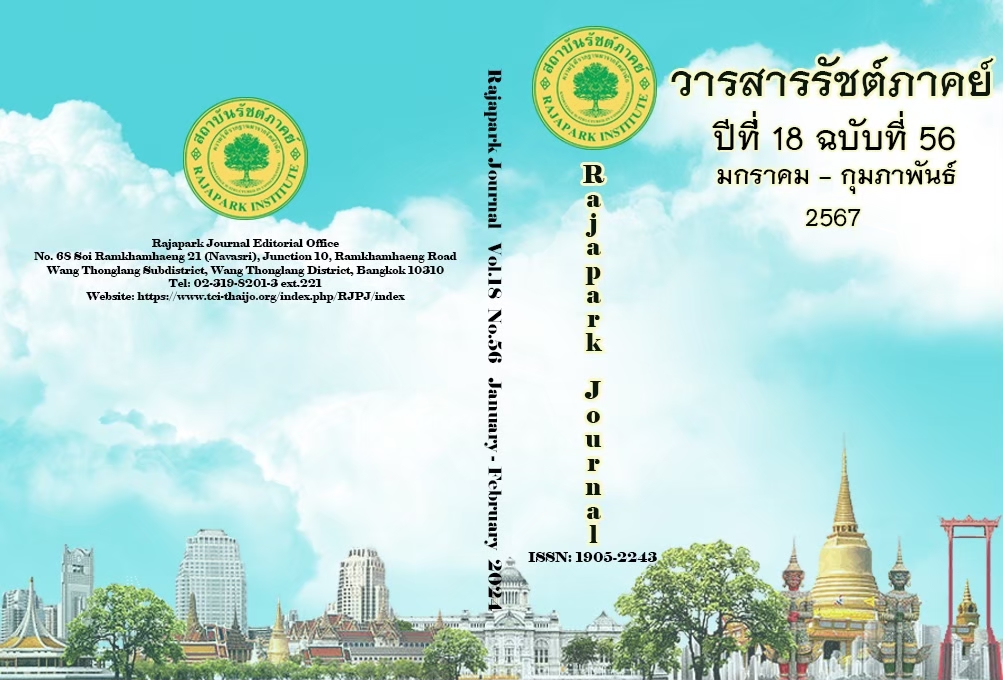The Development of English Communication Skills for Tour Guiding in Phranakhon Si Ayutthaya Province Using Programmed Lessons Through Digital Media
Main Article Content
Abstract
The objectives of this research were 1) to study the states, and problems of developing English communication skills in listening, speaking, and knowledge for tour guiding in Phra Nakhon Si Ayutthaya Province of Mathayomsuksa 6 students, 2) to create programmed lessons via digital media for tour guiding in Ayutthaya province with an efficiency of 80/80 3) to compare the learning achievements between before and after with digital programmed lessons and 4) to compare the learning achievements between before and after practicing in English communication skills with the English listening and speaking communication skills development exercises. The research instruments were 1) questionnaires, 2) programmed lessons through digital media, 3) a learning achievement test, 4) English communication skills development exercises for listening and speaking, and 5) an evaluation form for English communication skills development in listening and speaking. The data were analyzed using percentage (%), mean (), standard deviation (S.D.), and t-test. The results showed that 1) the teachers' attitudes towards English communication skills in listening and speaking were at a low level, while students' points of view were at a moderate level, while the knowledge of tour guiding in Phra Nakhon Si Ayutthaya Province from the perspective of history teachers and students was at a low level, 2) the programmed lessons via digital media were effective at 82.96/81.60, 3) the learning achievement of students who learned with the digital media program had higher scores than before learning at the statistical significance level of .05, and 4) the academic achievement of students who studied with the English communication skills development exercises had higher scores after the practice than before the practice, with a significant difference at the .05 level.
Article Details

This work is licensed under a Creative Commons Attribution-NonCommercial-NoDerivatives 4.0 International License.
Views and opinions appearing in the Journal it is the responsibility of the author of the article, and does not constitute the view and responsibility of the editorial team.
References
Aumgri, C., & Apirating, K. (2019). The Development of Digital Media via Augmented Reality by
Using Collaborative Learning STAD in Computer Courses. Grade 6 Students. Journal of Project in Computer Science and Information Technology, 5(2), 18-27. https://ph02.tci-thaijo.org/index.php/project-journal/article/view/232106
Bootpala, N. (2020). A Development Students’ Listening and Speaking Skills in English for Communication Using Simulations. Journal of Education, Mahasarakham University, 14(1), 98-108. http://202.28.32.51/journal/home/journal_file/662.pdf
Chansawang, W., Impat, A., Komjakraphan, P., Piriyakoontorn, S., & Buapech, A. (2011). Effects of
Community Health Nursing, Principle of Epidemiology, and Basic Essential Treatment Programmed Instruction in Tutoring Process. Journal of Nursing and Education, 4(3), 106-112. https://he01.tci-thaijo.org/index.php/JNAE/article/view/638
Dornbundit, P., Tongraung, P., & Senamontri, A. (2015). Effect of an Online Chemical Introduction
Program for First- Year Undergraduates in the Faculty of Science. Journal of Research Unit on Science Technology and Environment of Learning, 6(2), 209-216. https://ejournals.swu.ac.th/index.php/JSTEL/article/view/7011
Hirunprueck, T. (2022). There are Number of Obstacles to Tourism in Thailand According to Foreigners’ Perspective. Ramkhamhaeng University. https://mmm.ru.ac.th/MMM/IS/twin92/6214154607.pdf
Keitpiriya, S., Busaman, S., Phetcaot, K., & Chaiwong, A. (2020). Secondary City Tourism Promotion with Digital Media Technology. Journal of MCU Nakhondhat, 7(12), 436-450. https://so03.tci-thaijo.org/index.php/JMND/article/view/249124
Kheamanee, T. (2015). Didactic: Knowledge for Effective Learning Management. Chulalongkorn University Press.
Klubsumran, J., Saenwat, J., Kiyasuan, K., & Kingsaeng, A. (2021). Developing English Listening and Speaking Skills Through Early Childhood Mulled Media. UMT Poly Journal, 18(1), 119-124. https://so06.tci-thaijo.org/index.php/umt-poly/article/view/248990
Koocharoenpisal, N. (2010). The Development of a Programmed Lesson on Organic Compounds for Undergraduate Students. Srinakharinwirot University. Journal of Science and Technology, 2(4), 54-67. https://ejournals.swu.ac.th/index.php/SWUJournal/article/view/1405
Koocharoenpisal, N. (2016). Promoting of Self-directed Learning Using the Programmed Lesson on Chemical Hazards to Develop Learning Outcome of the Lower Secondary Students. Journal of Education Naresuan University, 18(2), 93-105. https://so06.tci-thaijo.org/index.php/edujournal_nu/article/view/61066
Krejcie, R. V., & Morgan, D. W. (1970). Determining Sample Size for Research Activities. Educational and Psychological Measurement, 30(3), 607-610.
Krutmanee, K., & Phuampai, S. (2015). The Development of English Listening and Speaking Skills of Grade 2 Students by Role Playing Instruction. In RSU National Research Conference 2015.
Ministry of Education. (2008). The Basic Education Core Curriculum 2008 Bangkok. Co-operative Federation of Thailand Printing House.
Na-Songkhal, J. (2018). Digital Learning Design. Chulalongkorn University Press.
Phuthorn, D. (2020). Responsible Tourism – RT Phone Home: Time to Travel Attentively. TAT REVIEW e-magazine, 6(1), 69-71. https://tatreviewmagazine.com/e_magazine/vol-6-no-1-january-march-2020-2/
Pichayasupanun, N., Sitthiwarakorn, S., & Nirachin, H., & Boonchum, P., (2022). English Vocabulary Learning Strategy to Improve Memorizing Skill with Prefixes and Suffixes through Video Activity of the Fourth-Year Students in English Program, the Faculty of Humanities and Social Sciences, Pibulsongkram Rajabhat University. Aksara Pibul Journal, 3(1), 74-86. https://so02.tci-thaijo.org/index.php/APBJ/article/view/255558
PISA Thailand. (2022). PISA 2018 Assessment Result: 15-Year-old Thai Students’ Knowledge and
Capability. Institute for the Promotion of Teaching Science and Technology.
https://pisathailand.ipst.ac.th/issue-2019-48
Pongpanich, N. (2011). A Study of Problems in English Speaking in Speech Communication of Management Sciences Students, Kasetsart University, Sriracha Campus: October 2007 to September 2008. Journal of Studies in the Field of Humanities, 18(1), 85-97. https://so04.tci-thaijo.org/index.php/abc/article/view/54201
Riyay, P., & Khamsri, T. (2012). The Development of the First Year Students’ Listening- Speaking Skills Using Computer Multimedia Program. North Chiang Mai University.
Seangchai, D. (1990). English Teaching in Primary School. O.S. Printing House.
Soosongdee, Y., & Rattanawanitpun, S. (2012). English Listening Competency for Communication of the 5 Level Secondary Students under the Secondary Educational Service Area Office 33 in Surin Province. Nakhon Phanom University Journal, 2(1), 51-57. https://www.npu.ac.th/npujournal/files_research/9/2-1_7.pdf
Suapoomee, W. (2020). Development of English Listening-Speaking Skills through Natural Approach for Prathomsuksa 2 Students Sahakornnikomklua School. Journal of Graduate Studies Bansomdejchaopraya Rajabhat University, 5(2), 51-62. http://ejs.bsru.ac.th/gradjournal/?cont=journal5-2
Suwanpanpha, S. (2020). Problem and Need of Foreigner Tourists Travelling in Thailand. Ramkhamhaeng University. https://mmm.ru.ac.th/MMM/IS/ml10/6114962050.pdf
Thumklang, K., & Thumklang, J. (2012). Development of Media / Educational Innovation for Teacher’s Academic Standing. Sathaporn Books.
Wilson, J. J. (2008). How to Teach Listening. Pearson Longman.


